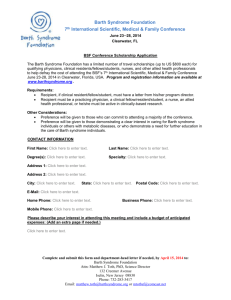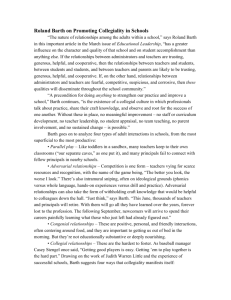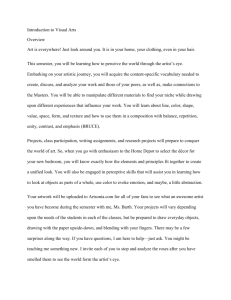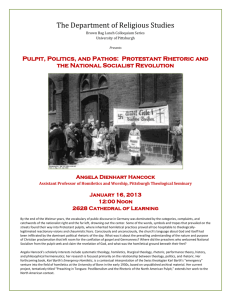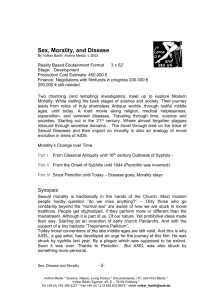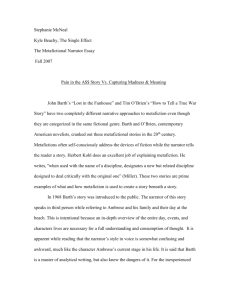Karl Barth, or: The self-constructed churchly isolation
advertisement
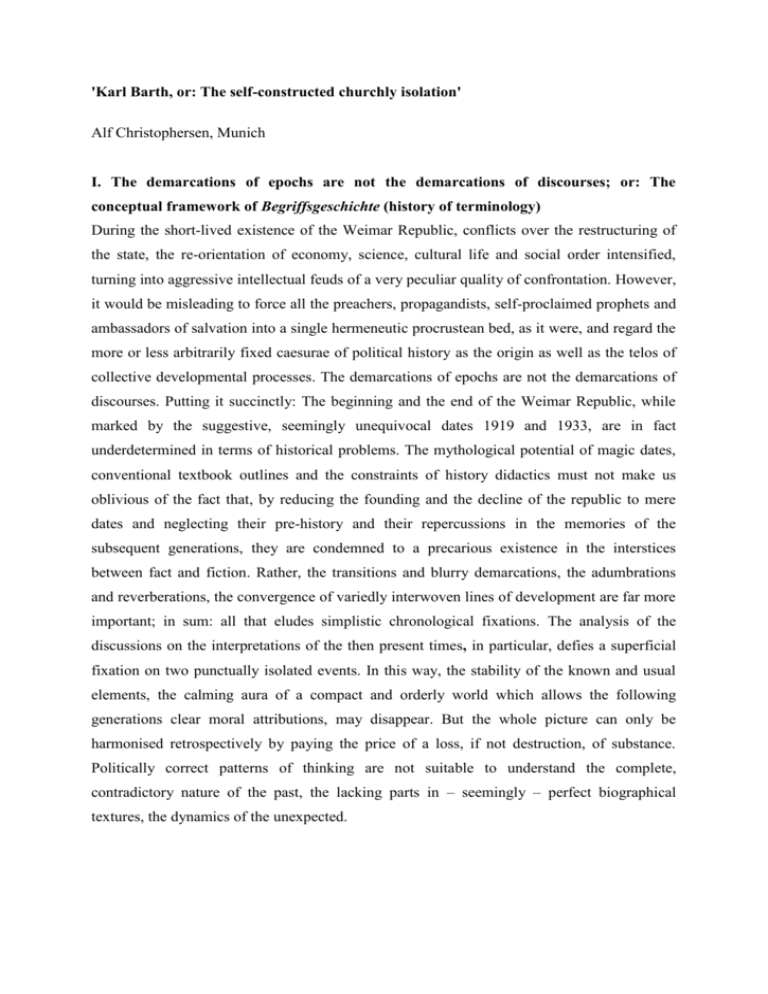
'Karl Barth, or: The self-constructed churchly isolation' Alf Christophersen, Munich I. The demarcations of epochs are not the demarcations of discourses; or: The conceptual framework of Begriffsgeschichte (history of terminology) During the short-lived existence of the Weimar Republic, conflicts over the restructuring of the state, the re-orientation of economy, science, cultural life and social order intensified, turning into aggressive intellectual feuds of a very peculiar quality of confrontation. However, it would be misleading to force all the preachers, propagandists, self-proclaimed prophets and ambassadors of salvation into a single hermeneutic procrustean bed, as it were, and regard the more or less arbitrarily fixed caesurae of political history as the origin as well as the telos of collective developmental processes. The demarcations of epochs are not the demarcations of discourses. Putting it succinctly: The beginning and the end of the Weimar Republic, while marked by the suggestive, seemingly unequivocal dates 1919 and 1933, are in fact underdetermined in terms of historical problems. The mythological potential of magic dates, conventional textbook outlines and the constraints of history didactics must not make us oblivious of the fact that, by reducing the founding and the decline of the republic to mere dates and neglecting their pre-history and their repercussions in the memories of the subsequent generations, they are condemned to a precarious existence in the interstices between fact and fiction. Rather, the transitions and blurry demarcations, the adumbrations and reverberations, the convergence of variedly interwoven lines of development are far more important; in sum: all that eludes simplistic chronological fixations. The analysis of the discussions on the interpretations of the then present times, in particular, defies a superficial fixation on two punctually isolated events. In this way, the stability of the known and usual elements, the calming aura of a compact and orderly world which allows the following generations clear moral attributions, may disappear. But the whole picture can only be harmonised retrospectively by paying the price of a loss, if not destruction, of substance. Politically correct patterns of thinking are not suitable to understand the complete, contradictory nature of the past, the lacking parts in – seemingly – perfect biographical textures, the dynamics of the unexpected. 2 „Terms,” Reinhart Koselleck states with conciseness, „are concentrates of many semantic contents.”1 The possible meanings of a word demonstrate the union of various constituent semantic elements within the term. „Meanings of words can only be exposed by way of definitions, terms can only be interpreted.” The theoretical premise of Begriffsgeschichte (history of terminology), in Koselleck’s sense, is „the convergence of term and history.” 2 It aims for an interpretation of history through its respective terminologies and uses their position in the intersection of many lines of influence to achieve this: potentials in semantic and real areas flow into the individual term; the term is subject to both changes in the situations in which it is employed and an unpredictable drive for the development of new terminologies. This history of terminology, free from philological limitations, is not about the exploration of matters of fact through findings in the history of language. Neither is it about self-sufficient eagerness to collect terminologies in the spirit of lexical completeness. It is about an introduction to „the experience of the respective terms and the theory contained therein.” „Thus, those premises which are suitable for theory,” whose metamorphosis is at the core of the debate, are being exposed. Categorical semantic contents experience a process of contemporisation, and traditional terms regain a dimension beyond the purely functional level in the realisation of past expectations. In the so-called Sattelzeit around 1800, terms began to crystallise which define historical eras themselves - development, history, revolution: they „are distinguished by temporal definitions, which concentrate process-based meanings and experiences.” At the same time, the potential to (ab)use many terms for ideology is growing. Collective singulars – like progress or freedom – become more prevalent. They need to be qualified by new predicates in order not to remain in a state of an „empty and blind formula” 3 Structural change is visible because an „increasing removal from compact circles of life, relative in length” becomes prevalent „while the increased degrees of abstraction of the terms (…) define new horizons of possible experience.”4 Eventually, the pluralisation of the social world, according to Koselleck, highlights the importance of the location in which a word is used, and thereby facilitates situations of rivalry and enforces a politicisation, as a chance but also as an obligation. On this background, semantic history always also appears as political history. As soon as terms reach into the political realm, they necessarily have a border-defining and a situation- 1 Reinhart Koselleck, Einleitung, in: Geschichtliche Grundbegriffe. Historisches Lexikon zur politisch-sozialen Sprache in Deutschland, ed. von Otto Brunner, Werner Conze und Reinhart Koselleck, vol. 1, Stuttgart 1972, XIII-XXVII; here: XXII. 2 ibid., XXIII. 3 ibid., XVII. 4 ibid., XVIII. 3 based quality. Put differently: the quality of the terminology of political debate is to be seen in its access to current reality and in its promises of future-shaping power. Depending on the degree of semantic charge it contains, it becomes an offensive weapon, a means of propaganda in the parties’ conflict about the supremacy in the interpretation of times, about the possessive interpretation of the past, the present, but also of the future. Temporally defined terms, in particular, and the concepts related to them are an expression of expectation, guiding anticipation of what is to come, and they thrive, exactly as demanded by the respective constellation of conflict, on their precision or their lack of focus. They remain tied to an internal and to an external perspective. The self-understanding of an individual or a group expressed by those terms does not necessarily match the external perspective, and vice versa. The political use of terminology attempts to activate such conflicts, which lie hidden under the surface of a deceivingly one-dimensional clarity of language. It exploits the opposition of connotations in order to establish or maintain the dominance of one’s own position. In other words: the fight is about the imposition of claims to rule and to implement one’s visions, about the imposition of clarity to delimit contingency. Not every era grants access to the factories of terminology and the armouries of language of the individual combatants in the fight for public opinion to the same degree. The history of terminology, too, knows „ages of security” (Stefan Zweig), phases of exhausted linguistic fantasy and largely undisputed, consensual rhetoric, on which, then, new dynamics of conflict arise – be it slowly, or accelerated by the catalysing effect of a catastrophe. Whoever, in the knowledge of these changes of the tides, wants to study the laws of motion of the history of terminology in the 20th century, will find a particularly rich terrain for investigation in the Weimar Republic. „Constellations” was Dietrich Henrich’s chosen title for his programmatic investigations of the „Problems and Debates at the Origin of Idealistic Philosophy (1789-1795)”. It is clear that the instruments he employs in the service of the history of philosophy can also be used for an analysis of the discussions on the interpretations of times in the Weimar Republic. Both cases are about the measurement of force fields within which the achievements of individuals need to be determined. Certain problems and perspectives need to be identified as urgent, bound to „a willingness to re-organise the own point of view, which is derived from the force-lines within this field, known to everybody.”5 The „motives and problems of the constellations 5 Dieter Henrich, Konstellationen. Probleme und Debatten am Ursprung der idealistischen Philosophie (17891795), Stuttgart 1991, 12. 4 within which an author was moving, and within which he become independent” 6 are anything but to be taken for granted. The classical categorisation of an author and his work in a biographical context, „doxography relying on detailed research, and individual thinkers’ history of motifs”7 have served their time and are obsolete. The works of individuals cannot remain a fixed point, they are always part of a complex, dynamic, whole development. The thinking space created by constellations, into which the works have been written, needs to be explored and interpreted synthetically. Exploring such thinking spaces renews past constellations, it calls them back to our attention. „History,” as Koselleck simply comments, „is always more or, maybe, less than can be said about it in terminology – just like language serves for more or less than is contained in real history.”8 This is why any approach necessarily remains fragmented and cannot be reduced completely to a term. But the constellations gain a new presence on the stages of the history of science and intellectual history in the reconstructive process of the archaeology of thought. In this field of constellations, fights over terminology and rivalries on the interpretation of an era, Karl Barth played a leading role during the Weimar Republic, National Socialism and most notably the post-war era, in which he became the paradigmatic theologian of the times, dominating his profession in both church and academia. Thus vanishes the stability of confidence, the comforting appearance of an orderly arranged world, bequeathing its descendents unambiguous moral judgements. Those who consciously experienced the demise of the „world of yesterday” were marked for life. The intellectuals among the traumatized witnesses of the Great War, however, at least had the opportunity to test compensatory strategies for the loss of existential security and innerworldly Urvertrauen (primordial trust). Certainly, for a long time the traces of these coping attempts have received sparse attention, also in theological academic writings. As especially the expansive studies in exile literature have proven for already a fairly long time, a readjustment of reconstruction perspectives can yield remarkably promising results. Theologians, Judaists and religious scientists, however, have hardly taken note of the pertinent single studies and large-scale projects so far. The deficient reception might have manifold causes; the biographical leaning of the self-historicization of a discipline the proponents of which have for the most part not chosen exile after 1933 is certainly not a minor factor. Hence, the generation of students was lacking the immediate confrontation with 6 ibid., 13. ibid., 15. 8 Reinhart Koselleck, Stichwort: Begriffsgeschichte [2002], in: Koselleck, Begriffsgeschichten. Studien zur Semantik und Pragmatik der politischen und sozialen Sprache, Frankfurt am Main 2006, 99-102; here 102. 7 5 this problematic; the more or less reverent recollection of their academic teachers generally followed the classic „life-and-work” pattern. With growing distance and the subsequent dissolution of partialities and cognitive blockades, it appears increasingly urgent to trace the relations between interpretatory models of theology and the experience of exile. The debates on the rise and impact of fascism and National Socialism, on adequate responses to the totalitarian challenge and the quest for an up to date profile in the struggle for ideological hegemony demand specific attention in the context of the history of the discipline. Any precise textual analysis in the conceptual framework of Begriffsgeschichte (history of terminology) will repeatedly encounter the theologization of political jargon and will be able to observe semantic transfer strategies, which closely aligned politics and theology in their competitive claim to found meaning. Based on the debates on self-identity and selfunderstanding during the Weimar Republic and National Socialism, in which theological and political claims to legitimacy and validity were continuously connected, this approach allows for entering into the - currently highly charged - question of the mutual cause-effect relationship of theology and politics and the closely related claims to (ethical) normativity. II. Karl Barth: a short Curriculum Vitae Karl Barth’s theological oeuvre was no more and no less that the lifelong attempt at helping the Christian faith find a language adequate to the word of god. Karl Barth was born on May 10 1886 in Basel. He was the son of a pastor and later professor of theology and brother of the famous philosopher Heinrich Barth. Barth was married to the violinist Nelly, née Hoffmann. Of his four children, two sons are university lecturers; one of his sons was killed in an accident. Barth died in Basel on December 10, 1968, aged 82. Karl Barth visited a high school (Gymnasium) in Bern and studied theology in Bern, Berlin, Tübingen and Marburg after graduation. From 1908-1909, he worked as a contributor to the Protestant journal „Christliche Welt”. Afterwards, he became a vicar in the reformed congregation in Geneva and was pastor in Safenwil, canton Aargau from 1911 to 1921. Since 1919, his literary capabilities increasingly emerged, as shown, amongst other writings, by the publication of the „Römerbrief” (1919), which was written in an expressionist idiom, or „Zur inneren Lage des Christentums” (1920). These writings led to his call to an extraordinary professorship of theology in Göttingen. At the suggestion of several German reformed congregations and with the generous financial support of the US Presbyterian church, a chair of reformed theology had been founded, which 6 Barth was to receive. The founder of „dialectical theology” attained a full professorship in dogmatics in Munster in 1925 and moved to Bonn in 1930. In 1932, he started his unfinished magnum opus and lifework „Die Kirchliche Dogmatik” („The Church Dogmatics”). Soon after, Barth experienced the rise to power of National Socialism and the ensuing struggle between church and state. In the summer of 1933, the journal „Zwischen den Zeiten” was replaced by the series „Theologische Existenz heute”, founded by Barth and Eduard Thurneysen. When he opposed the endeavours of the so-called „German Christians” Barth, became renowned beyond the limits of theological expert groups. As a theological dissociation from the heresy of the German Christians, the „Barmen Declaration” was mainly the result of his efforts. In late 1934, he was removed from his chair upon refusing to take an oath to Hitler. He then immediately followed a call to the university of his hometown Basel. In late 1935, he was expelled from Germany when he attempted to attend a convention in Elberfeldt. As a result of his public condemnation of the invasion of Czechoslovakia, his honorary doctor title of the Münster university was revoked in June 1939. Meanwhile, Barth had published texts like „A Letter from Switzerland to Great Britain” (1941), „The Church and the War” (1944) and „Eine Schweizer Stimme” (1945) („A Swiss Voice”) in Switzerland. Some of the writings with which Barth continued to intervene in the discourse on the objectives and the essence of contemporary Christianity are „Protestant theology in the nineteenth century: its background and history” („Die protestantische Theologie im 19. Jahrhundert“ (1947; engl. 1972), „Against the Stream (Gegen den Strom)“ (1954), „Wolfgang Amadeus Mozart“ (1956), „How to serve God in a Marxist Land“ (1959), „Evangelical Theology: an introduction“ (1962; engl. 1963). During the East-West confrontation, the religious socialist Barth did not reject Communism – or rather, its manifestations – as consistently as he did National Socialism before. Some critics were not content with his explanation that he considered the pertinent statements made by others sufficient. In 1951, he propagated a neutral Germany. In 1961, Barth retired from his chair in Basel. In early March 1962, he gave his last lecture „On love”. In April 1962, Barth visited the US, where he gave various lectures at Princeton and the University of Chicago. After retirement, Barth continued to work on „Kirchliche Dogmatik”. III. Karl Barth and the „Bekennende Kirche” Still in 1945, Wilhelm Jannasch, Martin Niemöller’s successor in the position of the director of the Pfarrernotbund following the latter’s imprisonment in June 1st 1937, published a small 7 documentation under the heading „Hat die Kirche geschwiegen? (Did the church remain silent?)” with intent to document the struggle of the Bekennende Kirche during National Socialism and confront allegations claiming the factual absence of churchly opposition. He combined the synopsis of pertinent texts with brief remarks and received remarkable attention: shortly afterwards the booklet was published in Switzerland in a slightly expanded edition, received considerable attention in the US, and Jannasch came to be regarded as „a stalwart member of the Bekennende Kirche“. Jannasch found his focus in Karl Barth’s theology. Not only did he closely align himself with Barth in systematic and practicaltheological matters, but also followed him during the Kirchenkampf (struggle between church and state) and the establishment of a firm confessional stance against National Socialism’s hegemonial aspirations in political power and Weltanschauung (ideology). The focus on the church was the result of the „reorganization of theology” during the 1920ies initiated by Karl Barth. Practical theology, accepting „church dogmatics”, was to be brought in line with the „centre of the divine word”. It was a matter of „pursuing scrupulous theological labour oriented towards the manifestations of and impediments to the life of the Christian community and assuming full responsibility, and, as circumstances demand, face serious conflict in case of a threat to the community,” Jannasch emphasized, referring to the experiences during National Socialism. Not „pulpit orators” but „preachers” with a new, matter-of-fact rhetoric were needed. At this juncture, the „initiative for a new way from the true theological dynamic” from the 1920ies was to be taken up again. However, in the immediate post-war era, Karl Barth was not greeted with the same affirmative enthusiasm everywhere, and was by no means regarded as an icon of anti-Nazi resistance spirit without reservations. Accordingly, to name one example, the systematic theologian Helmut Thielicke took the part of the opposition against the Swiss accuser during the heated controversy surrounding the „Stuttgarter Schuldbekenntnis (confession)” of the German Protestant church council in October 1945. Barth’s explicit accusations presented in lectures held in Tübingen and Stuttgart provoked vehement and emotional debates.9 The „disaster“, according to Barth, „unequivocally originated in .Germany“.10 In contrast, Thielicke tackled „the question of guilt […] on the religious level alone, taking up a position typical of post-war Protestantism’s cf. Stefan Pautler and Trutz Rendtorff, „Die großen Pläne und die lauten Worte müssen wir begraben“. Das theologische Programm nach 1945, in: Saul Friedländer/Norbert Frei/Trutz Rendtorff and Reinhard Wittmann (ed.), Bertelsmann im Dritten Reich, München 2002, 535-541 (536 f.). Cf. also Arnulf von Scheliha, Art. Thielicke, Helmut, in: Religion in Geschichte und Gegenwart, vol. 8, Tübingen 42005, 363 f. 10 Karl Barth, Ein Wort an die Deutschen [1946], in: K. B., „Der Götze wackelt“. Zeitkritische Aufsätze, Reden und Briefe von 1930 bis 1960, ed. by Karl Kupisch, Waltrop 1993, 87-97 (93). 9 8 strategies for coping with its own history“11. Regarding the display of what he considered the „pathos of a right to retribution”, he rejected an unlimited confession of guilt. Thielicke received passionate consent as well as harsh criticism. Ernst Wolf, for example, one of the Protagonists of the „Bekennende Kirche”, voiced his irritation in an open latter and associated Thielicke’s commentary with „several ‘political treatises’” by Paul Althaus and Emanuel Hirsch’s „The Fate of Germany”, and suspected a commitment to the rationale and mentality of the latter. They had „led astray […] and partly even directly to National Socialism (with the „order of creation” ideology and a Lutheran placet). The experience of war and exile in its very specific form the politicization of theology and theological sublimation of politics are, put succinctly, the key notes of the interpretation of Karl Barth’s biography and writings. The experience of crisis during the upheavals of war and revolution and an inspiring confluence of political and theological visionary energies affected his writings during the Weimar Republic. Barth’s example, however, also clearly demonstrates that merely changing the focus of interpretation from 1933/34 to 1914/1918 would be fallacious, especially in the comparative perspective on Emanuel Hirsch. Rather, not only in his case, developmental trajectories and the relationship between continuity and change, renunciation and persistence, self-revision and new beginnings in the individual work and biography are of prior interest. Only the focus on the overall theological development, which, at transitional moments in particular, demands precise, source-critical examination, a perspective no longer bound to a single historic key date, allows for an adequate interpretation of the historicity of the publications and their historic impact. This applies for the Weimar Republic just as for National Socialism and the post-war era. IV. Karl Barth – Aspects of his theology Against all attempts at attaining knowledge of the divine gained independently of the previous revelation of god, Karl Barth vehemently opted for a christological argument: the selfrevelation of god. God is knowable only through Christ, and not through acts of creation of any kind. Only in a reconstructive perspective on Christ, man can hope to fathom his essence. Barth’s anthropology from the perspective of „phenomena of human nature”12 is therefore a deduction from christology guided by the insight that man and god must not be equated. According to 11 12 Pautler/Rendtorff, „Die großen Pläne [...]“, 537. Cf. Barth, Dogmatik, vol. III/2, 82-157 9 Barth, the fundamental theological-anthropological question is „what is man’s creaturely essence, inasmuch as we must recognize in it a perpetual continuum, an unchanged and unchanging essence in the face of sin? „13 The path to be travelled hence covers the distance from the essence which „appears to us in the person and human being of Jesus“, to the „essence of man [..] which is characteristic of any human being, of all other human beings „ 14 Barth attaches great importance to the „unfathomable grace“ of god, with which he accepts every creature, so that „in the compassion of Jesus, the free choice of the divine will becomes effective and visible as human kindness“15. Barth sees the „Yes“ of god in the whole of creation: His work „consists particularly in the benefit that in the limits of its creatureliness what He has created may be as it is actualised by Him, and be good as it is justified by Him“16. God’s creation, Barth assumes, had the following intention: „he willed the existence of a being which in all its non-deity and therefore its differentiation can be a real partner; which is capable of action and responsibility in relation to Him; to which his own divine form of life is not alien; which in a creaturely repetition, as a copy and imitation, can be bearer of this form of life”. Therefore, Barth argues, there is an analogy between god and man „which is simply the existence of the I and the Thou in confrontation“17. This relation is, in turn, reflected in human intersubjectivity as difference and the interpersonal relationship, specifically in the creaturely difference of man and woman. Humanity as such, the humanity of every human being, consists in the determination of its being as togetherness with the fellow-man. Against this backdrop, compassion figures prominently for Barth. In his gloss on the epistle to the Romans, which revolutionized contemporaneous theology, Barth explicated, considering Romans 13, 11, that the appeal to compassion at the momentary instant is a „‚moment’ between the times”, which is not a moment in time. Every moment in time can however be raised to the dignity of this moment. It is this moment, the eternal moment, the Now when past and future arrest their movements.18 In the eternal moment, time reveals its secret. Man leaves and comes, time does not. The eternal moment, as a moment of revelation, is always and never. „Every moment in time bears 13 Barth, Dogmatik, vol. III/2, 50. Barth, Dogmatik, vol. III/2, 54. 15 Barth, Dogmatik, vol. III/2, 267. 16 Barth, Dogmatik, vol. III/1, 377. 17 Karl Barth, The Doctrine of Creation. Church Dogmatics. vol. III/1. Transl. Bromiley, Geoffry William, Knight, Harold, Thomson, George Thomas and Thomas Forsythe Torrance. London/New York: Continuum Publishing Group, 1960, 184 f. 18 cf. Barth, Römerbrief, 481. 14 10 within it the unborn secret of revelation, and every moment can be thus qualified“19. It is the transcendental significance of the „moment” that is to be grasped. The faith which recognizes revelation is the fulfilment of the law. Where past and future have been qualified by the Now of revelation that lies in the midst between the two, there lies the opportunity for the occurrence of love – for its ‚living regiment’ (Kierkegaard).“20 The touch of god’s freedom and love belong together. The „essentially revolutionary action” of love is that it acts in the „knowledge of the eternal moment“ and does not intend to create anything which persists „in time”. Love keeps an inexorable distance towards everything „which has been done already”, and thus points „away from itself to the End which is the Beginning“21. The reception of Kierkegaard already perceptible in Barth’s conception was of utmost importance: „My reply is that, if I have a system, it is limited to a recognition of what Kierkegaard called the ' infinite qualitative distinction ' between time and eternity, and to my regarding this is as possessing negative as well as positive significance „22 In his „Philosophical Fragments”, Kierkegaard conceives of the „moment” as „fullness of time“, the touch of time and eternity: „A moment such as this is unique. To be sure, it is short and temporal, as the moment is; it is passing, as the moment is, past, as the moment is in the next moment, and yet it is decisive, and yet it is filled with the eternal.“23 By focussing on the event of revelation, Barth strives to absorb the unsettling impact of what Kierkegaard referred to as the „vertigo of freedom“24 and the „sickness unto death“. „Anxiety is the possibility of freedom“25. According to the Danish philosopher, man experiences himself as imperilled in his innermost core. Only the love of god can help him escape from the vortex of despair. „A human being is a synthesis of the infinite and the finite, of the temporal and the eternal, of freedom and necessity”26. Despair emerges as „a sickness in the spirit, in the self“. Man desires not to be himself and, at the same time, only to be himself. Any attempt to fulfil both 19 Karl Barth, The Epistle to the Romans, transl. Edwyn C. Hoskyns. New York: Oxford University Press, 1968, 497. 20 Barth, Römerbrief, 481; trans.: Barth, Karl. 1968. The Epistle to the Romans, 497 f. 21 Barth, Römerbrief, 482; trans.: Barth, Karl. 1968. The Epistle to the Romans, 498. 22 Barth, Römerbrief, XIII; trans.: Barth, Karl. 1968. The Epistle to the Romans, 10. 23 Kierkegaard, Philosophische Brocken, 16; trans.: Kierkegaard, Søren. 1985. Philosophical Fragments. Ed. Howard Vincent Hong. New Jersey: Princeton University Press, 18. 24 Kierkegaard, Begriff Angst, 60. 25 Kierkegaard, Begriff Angst, 161. 26 Kierkegaard, Krankheit zum Tode, 8; trans.: Kierkegaard, Søren, The Sickness unto Death. A Christian Psychological Exposition for Edification and Awakening by Anti-Climacus. Transl. Alastair Hannay. London: Penguin, 2004, 43. 11 desires is doomed to failure. Faith, Kierkegaard argues, means that „in relating to itself and in wanting to be itself, the self is grounded transparently in the power that established it.”27 V. The momentary view of a bird in flight From September 22 to 25 1919, the religious-social conference was held in the Thuringian town of Tambach. Mostly because of the paper „Der Christ in der Gesellschaft“ (The Christian in Society) presented by Barth, the conference almost gained mythical status. According to the dominant reading, this lecture marks the epochal emergence of „Dialectical Theology”, „Crisis Theology” and „Theological Revolution” of the Barthian kind. In other words: Tambach became a Protestant „Site of memory”. However, this retrospective mythologization had little to do with its factual, theologically and historically verifiable impact. Still, Tambach paradigmatically represents the networks of intellectual communication and the ideological interrelations of the 1920s. Here, pre-war theology came under attack by a new generation of revolutionary minded theologians with unprecedented intransigence. The main question of the gathering was to find solutions to the pressing social conflicts of the post-war era within a Christian frame of orientation. Barth left no doubt that only the radical opposition against any politicization of Christianity had prospects for success. For clarification, Barth chose a metaphor which can be considered classic by now: „Denn unsere Stellung zur Lage ist tatsächlich ein Moment einer Bewegung, dem Augenblicksbild eines Vogels im Fluge vergleichbar, außer dem Zusammenhang der Bewegung ganz und gar sinnlos, unverständlich und unmöglich. Damit meine ich nun freilich weder die sozialistische, noch die religiös-soziale Bewegung, noch die allgemeine, etwas fragwürdige Bewegung des sogenannten Christentums, sondern die Bewegung, die sozusagen senkrecht von oben her durch alle diese Bewegungen hindurchgeht, als ihr verborgener transzendenter Sinn und Motor, die Bewegung, die nicht im Raum, in der Zeit, in der Kontingenz der Dinge ihren Ursprung und ihr Ziel hat und die nicht eine Bewegung neben andern ist: ich meine die Bewegung der Gottesgeschichte oder anders ausgedrückt: die Bewegung der Gotteserkenntnis, die Bewegung, deren Kraft und Bedeutung enthüllt ist in der Auferstehung Jesu Christi von den Toten.“28 27 Kierkegaard, Krankheit zum Tode, 81; trans.: Kierkegaard, Søren. 2004. The Sickness unto Death, 79. Karl Barth, Der Christ in der Gesellschaft, in: Anfänge der dialektischen Theologie, vol. 1: Karl Barth Heinrich Barth - Emil Brunner, ed. by Jürgen Moltmann [1962], München 51985, 9 f. 28 12 „For our position towards the situation is indeed an instant of a movement, and any view of it is comparable to the momentary view of a bird in flight. By this I mean neither the socialist nor the religious-social movement, nor the general, slightly questionable movement of socalled Christianity, but a movement from above, as it were, which transcends and yet penetrates all these movements and gives them their inner meaning and momentum; a movement which has neither its origins nor its aim in space, in time or in the contingency of things, and yet is not a movement apart from others: I mean the movement of God in history or, otherwise expressed, the movement of God in consciousness, the movement whose power and importance are revealed in the resurrection of Jesus Christ.” Barth’s lecture was regarded as immensely liberating. As a case in point, the religious socialist Günther Dehn put it as follows: „I realized the inappropriateness of protesting against a church which is bound to feudal and capitalist powers or mired in nationalism, only to bind it anew to Socialism, Republicanism and Internationalism.“ Barth remained faithful to these principles and, in stark contrast to his theological antagonist Paul Tillich, owes his tremendous importance for the history of theology precisely to the juxtaposition of the church in opposition to the reality of practical politics – even at the danger of a self-constructed churchly isolation.
